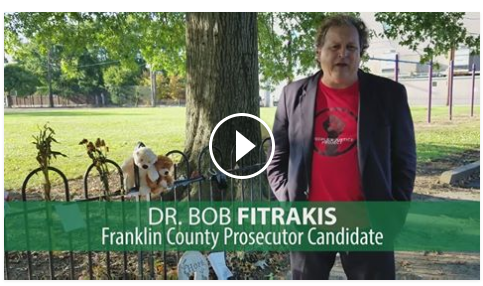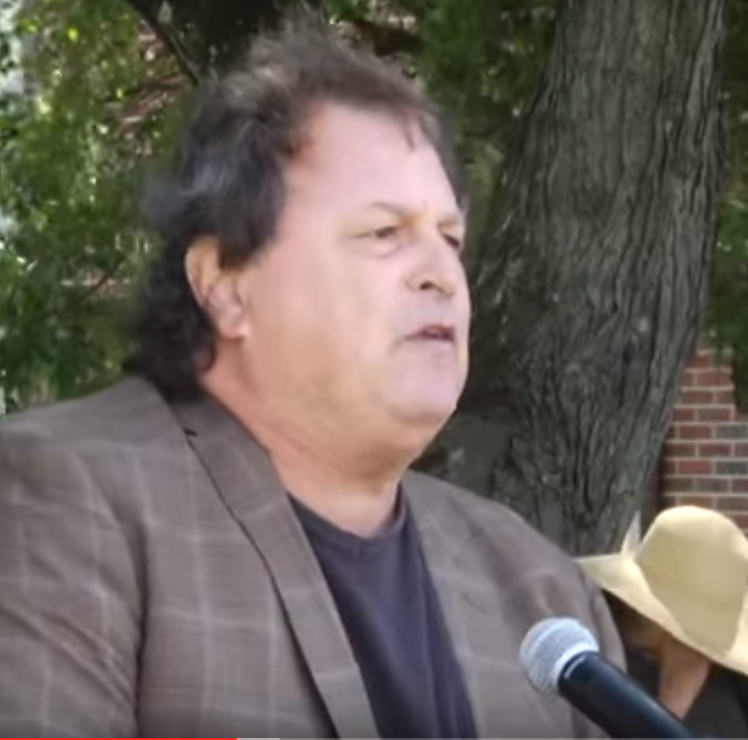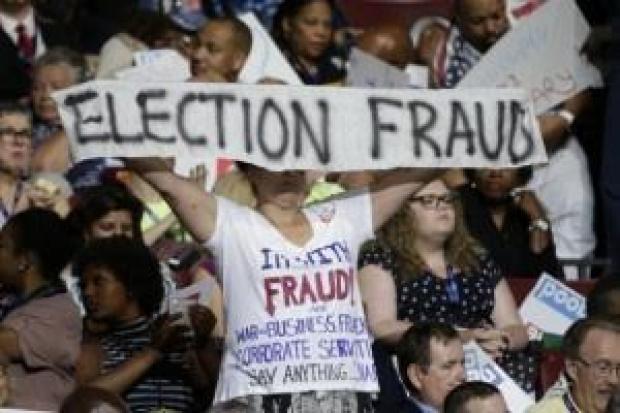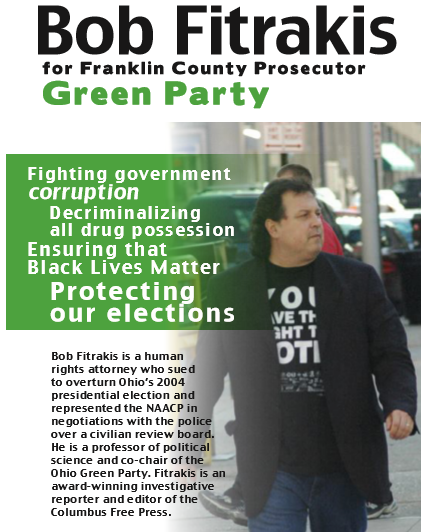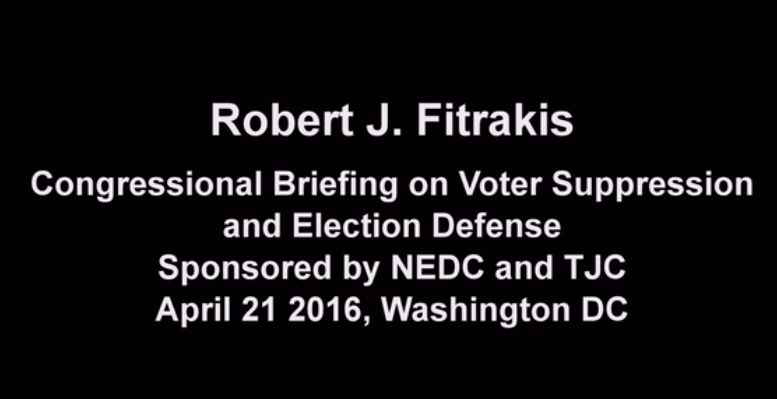Columbus Alive Archive Article
The gatekeepers (Bail bonds)
05/07/1997
FEATURED ARTICLE
The gatekeepers
Striking it rich in the bail bond business
by Bob Fitrakis
Despite a city ordinance prohibiting the soliciting of business by bail bondsmen, “in or around any court or public place,” a month-long investigation by Columbus Alive revealed that the law is routinely ignored. One firm, SMD & HLS Bonding Company, appears to be running its business from the “interview” room next to arraignment Courtroom 4D in the Municipal Court building. SMD & HLS bail bonders linger in the hall and sit in the back of the court and appear to be soliciting business.
The so-called public “interview” room appears to function as a high-powered office for the SMD & HLS Bonding Company, listed in the yellow pages as four different firms: Handler Bonding, Lowell Fox, Sam English and A-Aa Absolute Bail Bonds. Still appearing in the yellow pages entry is a photo of Sam English, who has been dead for several years. As of the writing of this article, the woman who answers the phone at the Sam English firm tells callers that Mr. English “isn’t in.”
Although the courthouse is a no-smoking public building, smoke wafts from the interview room when the door is opened as bail bondsmen hustle family and friends of defendants from the arraignment court to their office equipped with phones and a criss-cross phone directory. As one highly placed law-enforcement source put it, “It’s the old adage. The best place to hide illegal activity is out in the open.”
A non-Handler bondsman pointed out what he saw as an analogous situation. In 1990, the Board of Commissioners on Grievances and Discipline of the Supreme Court of Ohio suspended Judge Ralph D. Dye Jr. of McConnelsville for using public space to conduct private business. The board labeled his free-rent arrangement at the courthouse “inexcusable, unfair to other attorneys and unethical.”
In a letter dated November 21, 1996, in response to a public records request, Municipal Clerk of Courts Paul Herbert, stated: “I have not been designated, nor do I have any authority to enforce the use of the conference room next to Court Room 4D. …The rules for the use of the room have been clearly posted on the door.”
Asked if his bondsmen are soliciting business on the fourth floor, Handler said in a telephone interview: “Totally untrue. I don’t need to solicit. I’ve been in business 25 years. I advertise. People refer other people to me.”
Are his bondsmen running a business out of the Interview room next to 4D? “No,” Handler responded.
Most court officials say that the interview room is set up to serve lawyers and their clients for privileged private discussion. On three different occasions, when Columbus Alive watched the Interview Room, the only people inside were bail bondsmen. The rules, according to a non-Handler bondsman, are “first-come, first-serve. But, it’s like the Old West. [Handler]’s got Woody Fox, a retired Columbus police officer working as a bondsman. He’s got Al Clark, former chief deputy at the sheriff’s department, and when you go up there, Handler’s got the nerve to tell you that you’re not supposed to be there. ‘No soliciting.’ So now I just sit by the phone and wait for people to call for bonds. It’s cheaper. Everyone over there has their palms out; if you pay one, you’ve got to pay ’em all.”
Handler now appears to be the top gun, but not after a fight—literally. In 1994, the Columbus Dispatch reported that “Bondsman Jack Bates said his nose was bloodied and his face bruised when Mark Glaser, a bondsman with Harvey Handler’s bail bonding agency, struck him in the face on the fourth floor of the Franklin County Municipal Court.”
Ironically, bail bondsmen were supposed to be a thing of the past. In 1972, Ohio Chief Justice C. William O’Neill attacked the Ohio General Assembly for yielding to “pressure from bail bondsmen in rejecting rules for criminal procedure” reforms proposed by the Ohio Supreme Court in January of ’72. In a Dispatch article, O’Neill stated that, “In 90 percent of the cases the bail bondsman renders no service and takes no risk, but keeps his profit.”
By 1974, the Franklin County Municipal Court initiated its Pre-Trial Release Program (PTRP) in hopes of eliminating the need for costly and often unnecessary bond fees in most criminal cases. The era of reform is long over in the Franklin County Municipal Court. Herbert acknowledges in his letter that between January 1, 1996 and September 30, 1996 SMD & HLS Bonding Company wrote far more bonds in Municipal Court than any other firm. The breakdown is as follows: SMD & HLS Bonding Company – 3411; Columbus Bail Bonds – 891; Chuck Brown Bail Bond Agency – 603; International Bonds – 424; Bates Bonding – 52; American Bail Bond Agency – 15; other – 75.
Whether it’s legal or not is a question few judges or court officials care to probe. A cozy relationship exists between bail bondsman Harvey Handler—who manages or controls the four different bail bonding agencies in Columbus—and judges, Clerk of Court officials and court employees. Handler is a major political contributor to judicial and Clerk of Court office candidates and sometimes generous benefactor to court employees.
“Handler runs the fourth floor,” said former bail bondsman Bill Neil. “It’s a protected racket. The reason they like the fourth floor of Muni Court is because the felons are initially arraigned there, even though they’re tried in Common Pleas.
“It’s easy money. They can bail somebody out and they know the charges will be dropped within two weeks in Municipal Court because they have to be tried in Common Pleas. They’re just taking people’s money with no risk involved,” explained Neil.
Neil claims he went “broke in the business. Every two weeks, when the clerks didn’t get paid, I had to spend $50 or $60 to get pizzas…. And I had to give a security guard 30 bucks to pass out my business card.”
Under the current system, for example, if you are arrested for felonious assault and your bond is set at $5,000, you must pay 10 percent, or $500, to the court for an “appearance bond” or $500 to a bail bondsman for a “surety” bond. In the case of an appearance bond, you would get all but 10 percent ($450) back when you appear in court. With a surety bond from a bail bondsman, you would get nothing back when you appear at trial. But if you paid a surety bond and failed to show at trial, the bondsman is legally liable for the entire $5,000 bond.
The type of bonds are set at the judge’s discretion. Judges may also set recognizance bonds and release the defendant without posting any cash.
“Judges vary greatly. When I was in the business, if [Municipal Court Judge] Anne Taylor was on the bench doing arraignments, we took the week off,” Neil explained.
Curiously, Criminal Rule 46 of Ohio Rules of Criminal Procedure concerning the “Pre-trial release in felony cases,” provides that judges should use “personal recognizance” or an “unsecured appearance bond” as the “preferred method of release.” But few judges besides Taylor appear to follow it.
Since the Municipal Court cannot try felony cases, arrested felons are seen by municipal judges primarily for the setting of bond. Court records indicate that arrested felons are routinely arraigned and bonded on the fourth floor of the Municipal Court building and, just as routinely, the charges are dismissed a short time later. Defendants are told that the case will “be dismissed for possible future indictment.”
A grand jury later meets in the Common Pleas Court and holds a hearing. If an indictment is handed up, a summons is usually issued for a Common Pleas court appearance. Thus, what the bail bondsmen know is that there is little or no risk involved in forfeiting a surety bond in Municipal Court since the charges against the defendants will be dismissed. “It’s a scam,” as one bondsman put it. By not carrying over the bonds from the Municipal Court arraignments of felons to Common Pleas Court cases, Handler and other bondsmen are regularly pocketing thousands of dollars in risk-free money. And defendants are often surprised when they are required to repost bond money when they are summoned to Common Pleas Court.
If Municipal Clerk of Courts Herbert, “wanted to put his foot down, he could end this practice tomorrow,” said a S. High Street bondsman critical of Handler. “I’ve practiced in Marion County, Delaware County, Madison County and Franklin County. This is the only place that allows this to go on,” he added.
Herbert, who is up for re-election this year, is on record defending the practices of his court. “…You must realize that surety bonds provide a valuable service to the criminal justice system. Not only do you have agents with a vested interest in catching and returning defendants to court to stand trial for their conduct, but the court holds the security (in the form of a power) that can be executed against for the amount of the bond if the defendant does not return or the agent does not pay the bond.”
Herbert pointed out in a telephone interview Monday that the interview room is “open to the public, attorneys and bondsmen.” While his office is on the fourth floor, he said he was unaware of any soliciting of business by bondsmen. “I have no idea; I don’t police those rooms.” He suggested that Administrative Judge David Fais or Building Manager Bill Charlton would be responsible. “I try to stay out of that area,” Herbert added.
Asked about his relationship with Handler, Herbert acknowledged that Handler is a political contributor to Herbert and other judges and court-related officials, but not a “big donor.” Herbert did term Handler “very supportive” of his own political campaign.
Both Neil and other bondsmen charge that the Clerk’s office allows another infamous “rip-off” of criminal defendants. All bonds include an additional fee collected for the Victims of Crime Fund and the Public Defender’s Office. In felony cases, this amounts to $41: $30 to the Victim’s Fund and $11 to the Public Defenders. When cases are dismissed, or defendants are found not guilty, the money is returned to the bondsman who posted it, not to the defendant who supplied the cash. Legally, the money belongs to the defendants, but all too frequently, bondsmen fail to return the money and pocket it as pure profit. With no court enforcement to return the funds, the bail bondsmen benefit. “Money for nothing,” one bondsman explained. Neil pointed out that since most of the defendants are poor and uneducated, they are “easy marks” who don’t understand the legal system and are unlikely to protest the practice. Plus, their reputation as suspected criminals does not garner much sympathy for their plight.
Asked if the bondsmen are essentially taking defendants’ money twice, Herbert responded, “I suppose they would [be]. You need to ask the prosecutors, they’re the ones that dismiss the cases.”
According to a 1994 Dispatch article, 1,279 defendants released on surety bonds set in Municipal Court skipped bond. Neil and other bail bondsmen charge that Municipal Clerk of Court Herbert and Franklin County Clerk of Courts Jesse Oddi show favoritism to Handler’s firms. “Hell, when I had to pay a bond for a skip, the deputy clerks used to joke that ‘Handler’s guys are never down here,’” said Neil.
The Dispatch article also reported that: “In reality, court officials say more than half of bond forfeitures are set aside by judges. They may forgive the debt at their discretion.” Court records obtained by Columbus Alive indicate that court officials seem to be more forgiving for the Handler firms than others. Take the case of Dean Hinchee, arrested in 1991. Handler posted a $3,500 surety bonded for Hinchee on November 11, 1991. When Hinchee failed to show on January 28, 1992, Handler had 30 days to produce him or forfeit the bond. In a November 1996 billing to the SMD & HLS Bonding Company, a Dean Hinchere is listed instead of Hinchee. Although the names are spelled differently, Alive has obtained copies showing that the case numbers are the same: 29681. In the ’96 Handler billing the court requests only $350 from SMD & HLS Bonding when the full amount that should have been forfeited by Handler in 1992 for Hinchee’s court skip is $3,500.
Either by accident or design, Franklin County Courts are apparently shaving a zero off of Handler’s bond forfeiture bills, in effect billing one of the court’s major political donors at only 10 percent of the amount due.
Asked about the apparent shaving, Herbert said, “It’s currently being litigated” and refused further comment.
Asked about the allegations that bills are being shaved, Handler answered: “Totally incorrect. It doesn’t deserve a response. My attorneys are dealing with it.”
When probed about allegations that court employees have accepted gratuities from Handler and other bail bondsmen, Herbert said, “I don’t think that’s going on; if it is, they need to knock it off. We’re not supposed to be taking anything of value; but it’s a gray area of the law.” Herbert pointed out that, unless there was a quid pro quo, a gift for service, any gratuities or perks provided court officials by bondsmen probably aren’t illegal. “We should avoid the appearance of impropriety, and I’ve instructed my people not to accept any gifts.”
The billing of bondsmen seems to be a haphazard system. Herbert and his deputy clerks reportedly have busied themselves of late putting records into “storage.” This may make it all the more difficult to account for the total amount of forfeited bonds owed the Municipal Court by bond firms. In an independent audit by KPMG Peat Marwick LLP for the period January 1, 1994 through December 31, 1994, the report states that the Municipal Court practices “other than generally accepted accounting principles.” In a June 25, 1996 letter, State Auditor Jim Petro—currently lobbying to head the U.S. General Accounting Office—”accepted” the KPMG report “in lieu of the audit required by Section 117.11 Revised Code.” Petro noted “The Auditor of State did not audit the accompanying financial statements and accordingly, we are unable to express, and do not express an opinion on them.”
The obvious beneficiaries of such a system are not the public or poor and uneducated defendants and their families and friends, but the incumbent judges and clerk candidates who receive political donations, and the bonding companies who benefit from court officials’ lack of oversight.


